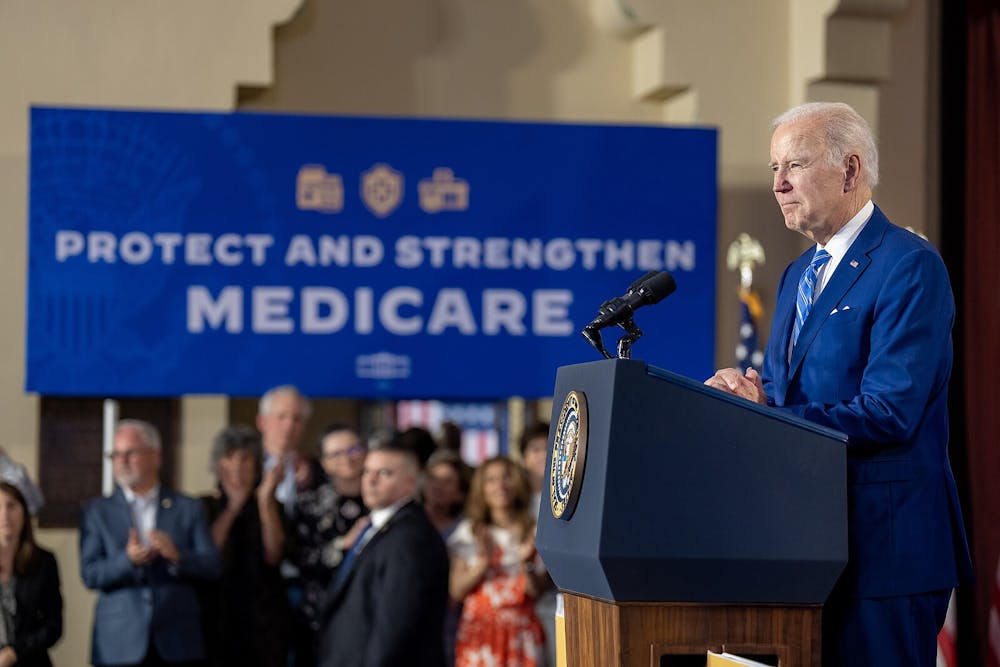By Aliyah Siddiqui
Nation and World Editor
For the first time, Medicare will be able to negotiate prices for medications directly with pharmaceutical companies. While the exact effect on patients is unknown, this change will reduce government spending by $98.5 billion within the next decade, according to the New York Times.
Medicare, which covers over 65 million Americans, was initially allowed to cover prescription drugs in 2003. At the same time, the program was also prohibited from negotiating drug prices, letting private insurance companies negotiate prices instead, according to NPR. However, this changed with the passing of the Inflation Reduction Act (IRA) in 2022.
“For far too long, pharmaceutical companies have made record profits while American families were saddled with record prices and unable to afford life-saving prescription drugs,” said Xaver Becerra, secretary of U.S. Department of Health and Human Services (HHS). “But thanks to the landmark Inflation Reduction Act, we are closer to reaching President Biden’s goal of increasing availability and lowering prescription drug costs for all Americans.”
The new negotiation program will include ten drugs that prevent or treat strokes, diabetes, heart failure, arthritis, cancers, autoimmune conditions, Chohn’s disease and more. The medications were chosen based on their higher costs, the number of citizens using them and if they did not have generic competitors. For example, Imbruvica, which treats blood cancer, is taken by 20,000 Medicare enrollees with a cost of $17,000 per month while Eliquis, a blood thinner, is taken by 3.7 enrollees for $600 monthly.
According to HHS, in 2022, the ten drugs cost Medicare enrollees 3.4 billion dollars in total out-of-pocket costs. While the amount of money Medicare patients will save is unknown, the New York Times predicts that the $35 out-of-pocket price cap for insulin and $2,000 cap for at-home medication will save more money.
This announcement comes as Biden prepares his bid for re-election, making it clear healthcare costs will play a major role in his campaign.
“For all of you out there, I get it, and millions of Americans get it,” Biden said. “I promise you. I’m going to have your back and I’ll never stop fighting for you on this issue.”
Despite Biden’s promise to lower prices, pharmaceuticals are pushing back, suing the Biden administration in attempts to halt the program. The main argument in these cases is that the program will violate the Fifth Amendment, which states that private property cannot be taken for public use without just compensation.
According to NPR, companies are arguing that Medicare is not negotiating, but instead setting price controls that will not fairly compensate companies. Companies are also arguing that they are being coerced: if they do not negotiate lower costs with Medicare, the pharmaceuticals will have to withdraw all of their drugs from Medicare and Medicaid, a caveat that will cost companies millions.
According to the New York Times, the Pharmaceutical Research and Manufacturers of America (PhRMA) lobbying group also warned that this program will have negative consequences, including that it would lead to fewer new drugs being developed due to the fear of price negotiations. The President of PhRMA, Stephen J. Ubl, called it a “a rushed process focused on short-term political gain rather than what is best for patients.”
“Giving a single government agency the power to arbitrarily set the price of medicines with little accountability, oversight or input from patients and their doctors will have significant negative consequences long after this administration is gone,” Ubl said.
Despite the pharmaceutical companies’ concerns, a poll from KFF, a health policy research organization, found that 81% of Americans, including 89% of Democrats and 77% of Republicans, support “authorizing the federal government to negotiate the price of some prescription drugs for people with Medicare.”
If companies agree to the negotiations, which will occur within the next two years, new prices will be in effect by 2026 after being announced in 2024. The government will also announce 15 more drugs eligible for negotiation in 2027, 15 more in 2028 and 20 additional drugs every year after.







